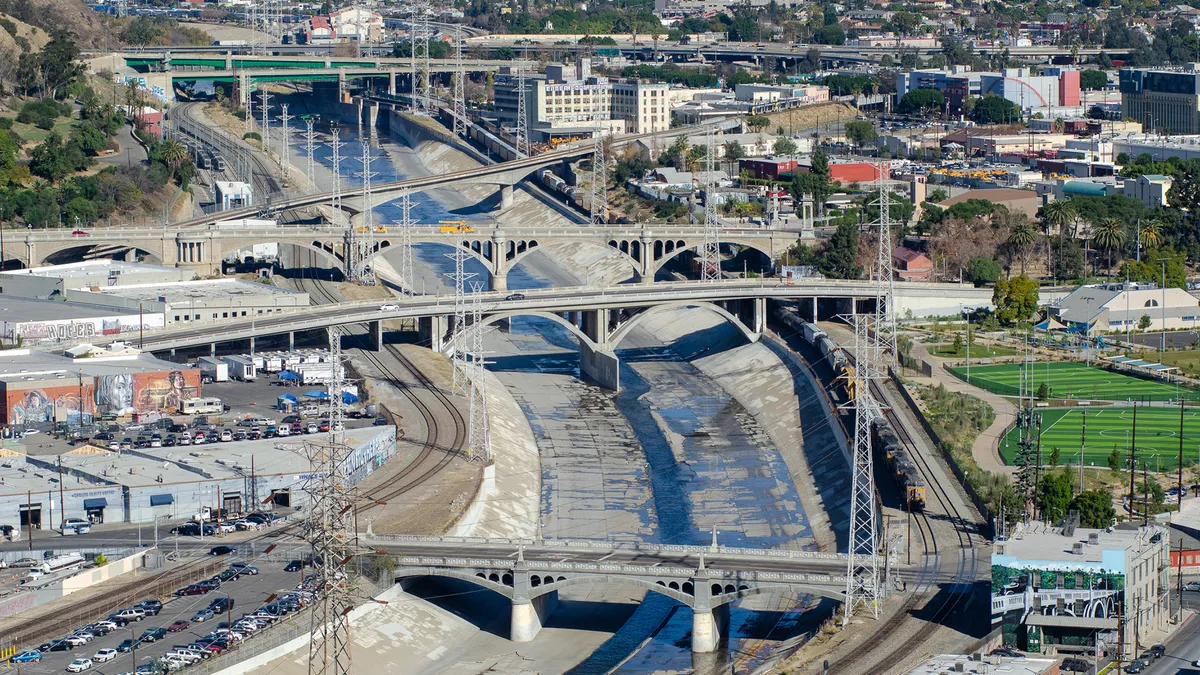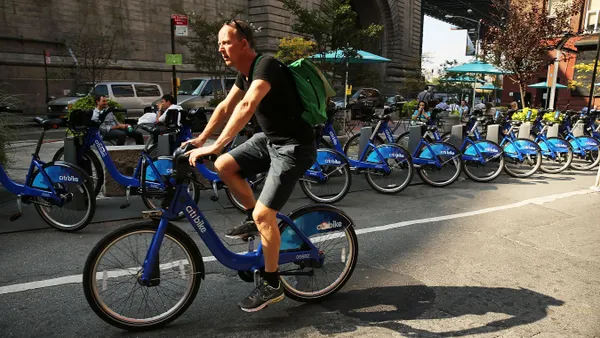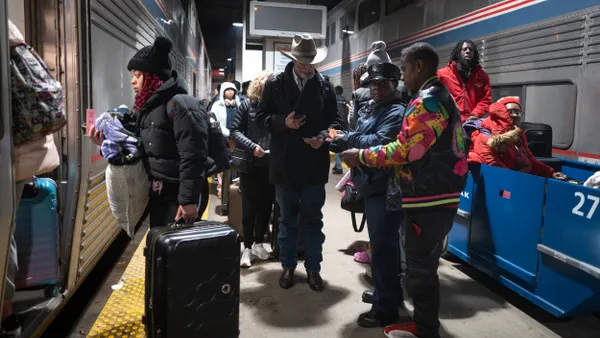Jacobs, a $14 billion global engineering, design, construction and consulting firm, has its hand in transportation infrastructure projects ranging from rail transit to highways, as well as waste management and much more. Public-sector clients provided nearly two-thirds of the company's revenue in 2019.
Jacobs CEO Steve Demetriou outlined a new strategy for the 75-year-old company this year that focuses on data solutions, consulting and climate response. The company's recent acquisition of StreetLight Data, which provides data analytics on traffic, mobility, and other topics, appears to align with that strategy.
Smart Cities Dive spoke with Ron Williams, Jacobs' people and places solutions, Americas, senior vice president and general manager; and Laura Schewel, StreetLight Data's founder and CEO about the thinking behind the acquisition and how they are working together to help cities and transit agencies solve their infrastructure challenges.
The following interview has been edited for length and clarity.
SMART CITIES DIVE: How did the acquisition of StreetLight Data come together, and how will it help cities and transportation agencies?
RON WILLIAMS: Jacobs and StreetLight Data have had a longtime relationship, working together on many projects. So we're not new to each other, but I think what we saw in transportation, the opportunities in front of us, is what attracted us to each other. Our clients will benefit directly from these data-driven solutions and create more informed decisions around infrastructure investment. Our clients are now trying to evaluate and think about how they're going to compete for grant funding under the [bipartisan infrastructure law]. StreetLight Data can provide unique insights into their communities and their transportation needs that can give them an advantage to out-compete and get more than their fair share of the money.
What are some of the biggest challenges your clients are facing?
LAURA SCHEWEL: Our customers tend to be people having to manage transportation, and the scope of the challenge facing them is absurd right now. You have all your normal challenges, plus the pandemic, plus figuring out what to do in the post-Uber age, plus figuring out all these new modes. Not to mention, we're supposed to do all this and we must get to [zero carbon emissions] and improve social equity. There's just no way any agency, no matter the size, can tackle the transportation challenges in front of it without a lot of help.
WILLIAMS: Our clients have seen a change in their ridership, where they've had to now become more agile in what they're doing and in the way that they're thinking. We're working on a project now in Los Angeles, the LA River bike path, which is going to connect communities that have been disconnected for a long time. That was a shift of thinking in LA, to say we should be thinking about pedestrians, bikers and connected communities.
How has the $1.2 trillion infrastructure package changed things?
WILLIAMS: We're at a pivotal moment in the U.S., particularly as we contemplate probably the largest infrastructure investment in history. Our clients are going to need to respond quickly to that, and in an agile way. The pace at which projects get completed — certainly, with inflation going up — saves them real money because as time goes on, your project is going to cost more and more.
SCHEWEL: Infrastructure is what drives social outcomes over the long term, whether it's carbon or equity or convenience or economic development. Big data brings huge efficiencies to a lot of the planning process and the operational and management processes.
What has this meant for your business?
SCHEWEL: As the industry has progressed, [people have] realized it's not just about replacing the old measurements; it's about measuring what we actually want to manage, which is environmental impacts, social equity and the efficiency of the transportation system.
For example, StreetLight Data has included income and demographic metrics for free in every subscription we've ever sold for 10 years, and no one ever used it until recently. But now, all of a sudden, they are becoming part of every conversation.
Safety is the other huge trend right now. People are very anxious to get data on things like scooters or autonomous vehicles because they feel new, so they're very concerned about the safety implications of those things.
What other types of clients are coming to you now?
WILLIAMS: Jacobs has seen tremendous growth as we support the [electric vehicle] industry. We're supporting a number of clients as they design and construct new EV manufacturing facilities around the world, battery plants as well. There's just tremendous growth in that area.
SCHEWEL: We also have customers in private transportation, which are all these new companies that may be offering robo-taxis or vertical takeoff and landing vehicles [VTOLs]. All those sorts of new mobility industries are making infrastructure decisions — just like cities — [but] they have a different mandate. And they're starting to reach out and use consulting firms like Jacobs and use software solutions like us to make those decisions.











